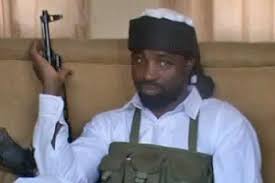Doubts over Boko Haram chief, Shekau’s death
(Nigeria) Doubts persisted on Tuesday over a Nigerian military claim
that the leader of Islamist extremist group Boko Haram may have been killed,
with questions raised over the timing of the announcement.
A security task force in northeastern Nigeria issued a
statement on Monday saying Abubakar Shekau, declared a "global terrorist"
by the United States, "may have died" from a gunshot wound after a
clash with soldiers on June 30.
"It is greatly believed that Shekau might have died
between 25 July to 3 August 2013" after being taken over the border into
Amitchide in neighbouring Cameroon, the statement said.
It was issued on the day the task force wrapped up its work
and handed over duties to a newly created military division charged with the
battle to end Boko Haram's four-year insurgency.
Task force spokesman Lieutenant Colonel Sagir Musa declined
to comment when contacted on Tuesday, saying he had left Maiduguri, the
epicentre of Boko Haram's insurgency and where the force was based.
National defence spokesman Brigadier General Chris Olukolade
distanced himself from the statement when contacted by AFP, while local media
reported on Tuesday that there was unease within the military over the claim.
"We are yet to get confirmation on that,"
Olukolade told AFP on Monday. "We are talking to our troops in the
field."
He could not be reached on Tuesday.
The widely-read Punch newspaper said senior members of the
military were unhappy with the statement because there was not yet enough
evidence to make such a claim.
It quoted a senior security source saying: "The hurried
release of the news of the killing of Shekau on the date a new division of the
Nigerian army was taking over from the JTF was rather suspicious,"
referring to the task force.
Other newspapers reported similar concerns, saying
information has been circulating about claims of Shekau's death, but the
intelligence was still being analysed.
Security analysts also urged caution.
"The military statement is not definite," Nnamdi
Obasi, Nigeria researcher at the International Crisis Group, told AFP.
"It didn't provide any hard evidence. Even in the way
they said it, they don't seem to be absolutely sure themselves."
Shekau has been considered the leader of the main Islamist
extremist faction of Boko Haram and the United States in March put a $7 million
(5.3 million euro) bounty on his head.
The US embassy has not commented and the US online wanted
notice for Shekau had not been updated.
Boko Haram's insurgency has left at least 3,600 people dead
since 2009, including killings by the security forces, who have been accused of
major abuses.
Boko Haram's targets have included security forces,
churches, worshippers at mosques and UN headquarters in Abuja, among others.
Nigeria's military began a sweeping offensive in the
northeast in May aiming to end the insurgency.
Shekau has often sent out video messages from unknown
locations. In a video message seen by AFP on August 12, a man who appeared to
be Shekau insisted that he was in good health and referred to attacks in early
August.
The military statement said the video was a fake.
Boko Haram has claimed to be fighting for the creation of an
Islamic state in Africa's most populous nation and largest oil producer, though
the group is believed to have a number of factions with varying aims.
Nigeria's 160 million population is roughly divided between
a mainly Christian south and mostly Muslim north.
Western nations have closely monitored the group for signs
of cooperation with outside extremist organisations.


Comments
Post a Comment